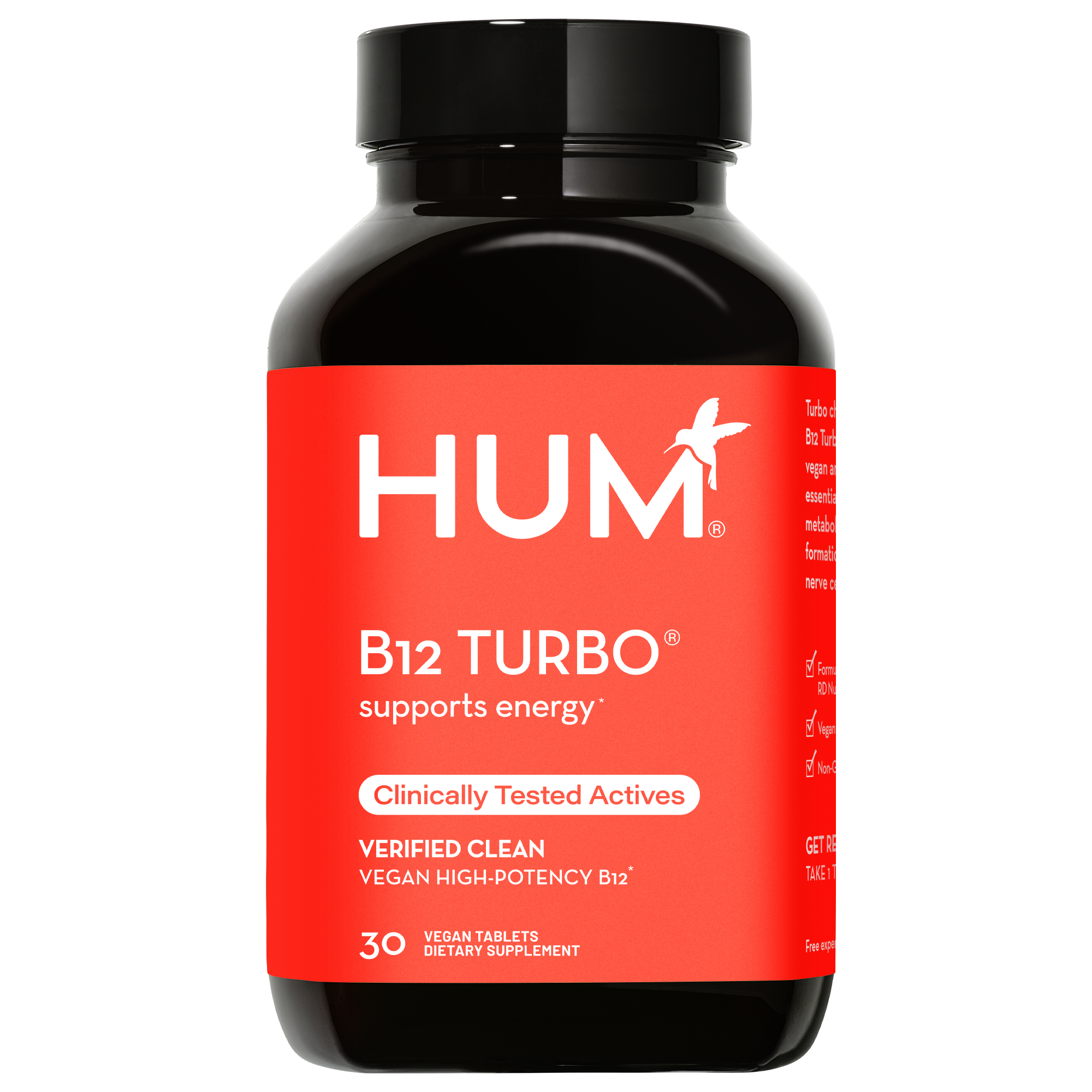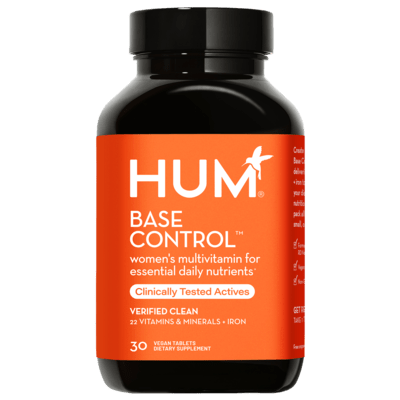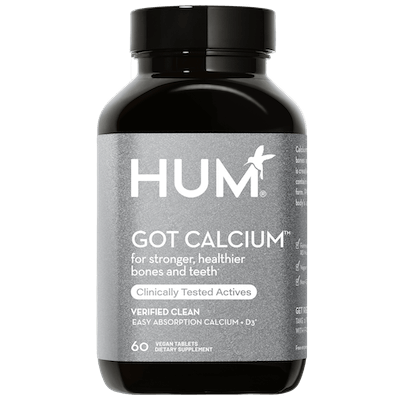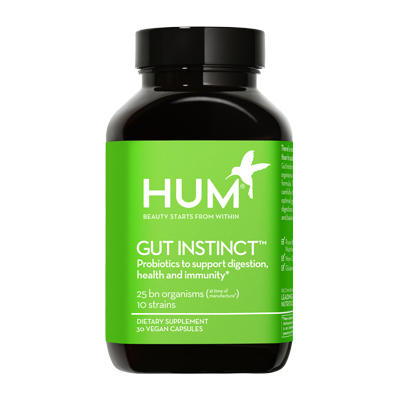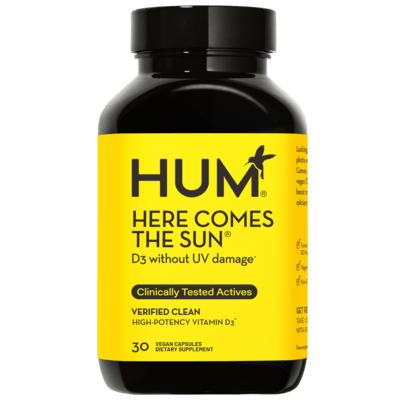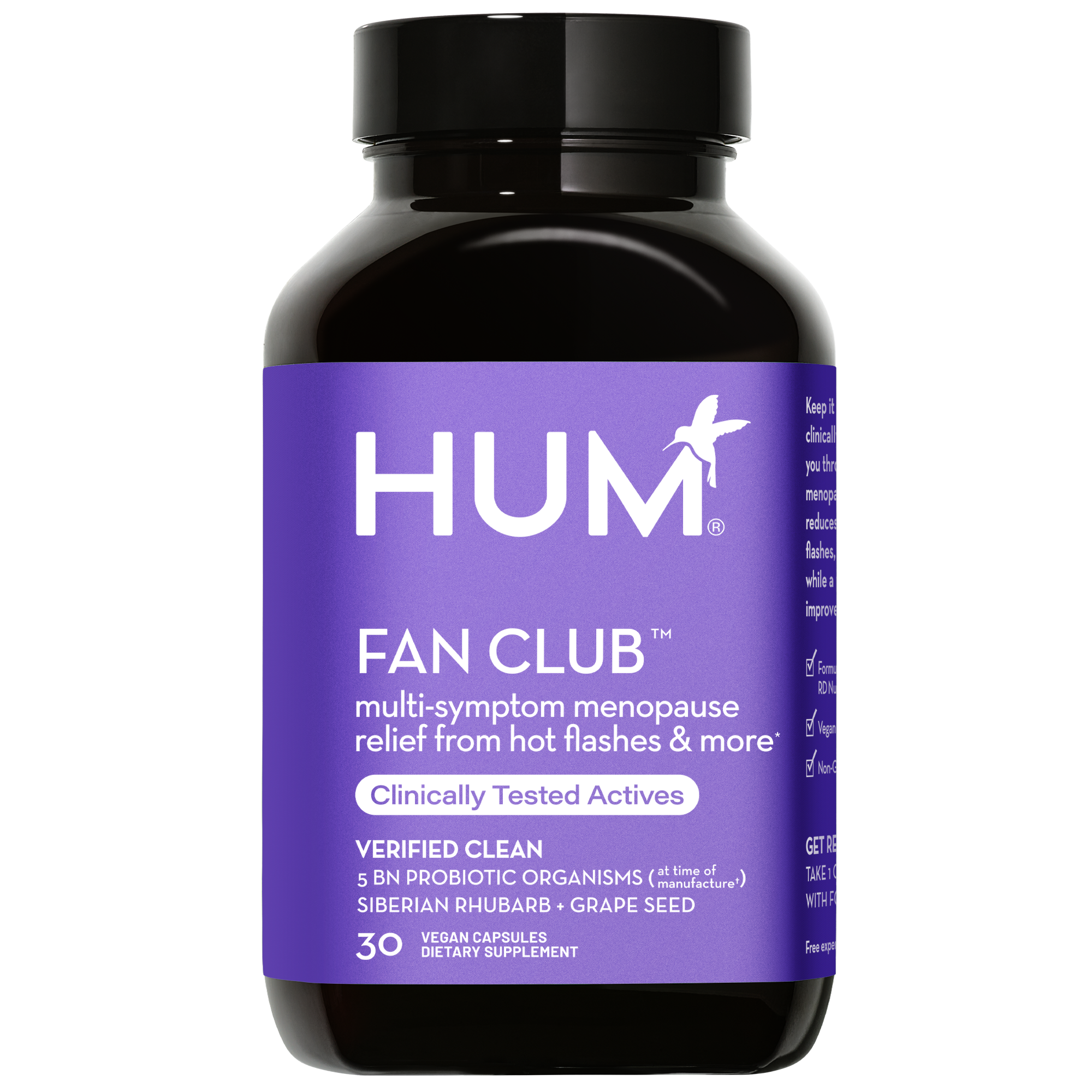The Best Vitamins to Take Daily, Based on Your Nutritional Needs
Maybe you’re new to supplements, or have dabbled but haven’t developed a consistent routine yet. HUM registered dietitian Chelsey Amer, MS, RDN, CDN, breaks the best vitamins to take daily.
You try to eat a nutritious, varied diet, you get outside for a daily walk, meditate, and do all the “wellness things,” but sometimes you may still need some extra nutrients. That’s where daily vitamins come in. Unlike some supplements that you may take on an as-needed basis or seasonally (like a digestive enzyme before a big meal or an extra-hydrating skin supplement in the wintertime), daily vitamins are your staples.
A well-planned supplement routine can help fill in any gaps missing from your diet. Here’s how to better understand your nutritional needs and the best vitamins to take daily.
Why you might need daily vitamins

As a registered dietitian, I’m frequently asked “What vitamins should I take daily?” While it’s possible for healthy individuals to get their necessary daily vitamins and minerals from a healthy, well-balanced diet, it’s not the reality for most individuals. Busy schedules, on-the-go eating, varied soil quality, lack of access to healthy foods, and certain food preferences, allergies, or intolerances all pave the way for less than stellar nutrient intake. (Plus, no one’s perfect every day!) As such, daily vitamins can be a useful way to fill nutritional gaps in your diet.
There are also times in your life when short-term supplementation can help support your healthy body. For instance, when trying to conceive or during pregnancy, there’s an increased nutrient demand that’s nearly impossible to meet through a healthy diet (especially if you also experience first-trimester nausea.)
In addition, the use of probiotics can help support a healthy gut during times of stress or sickness. Or if you drastically change your diet, such as from eating eat to adopting a vegan diet, you may need some nutritional support.
You may also need to take vitamins daily if you have certain medical conditions. For instance, an ill-functioning digestive system that causes malabsorption may require supplementation. Elevated cholesterol levels can also benefit from specific supplements (learn more below).
While not everyone needs daily vitamins, many people can benefit, and supplements can be a way to keep your body in tip-top shape.
The best vitamins to take daily
The best vitamins to take daily are those nutrients that may be lacking in your body due to your diet and the changing environment. Of course, this is why your supplement regimen should be individualized based on your needs (more on that later.)
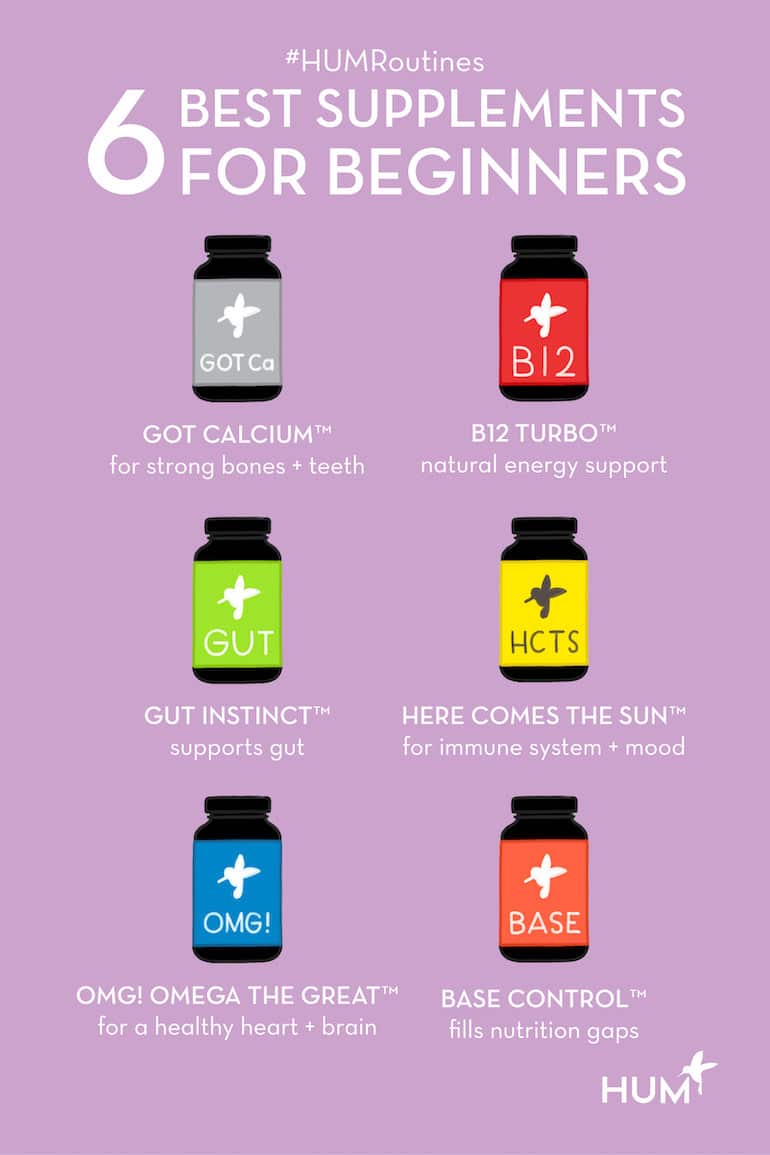
Vitamin D
For years experts have warned of a vitamin D deficiency “epidemic” of sorts. What do they mean? It’s estimated that over one billion people worldwide have inadequate vitamin D levels.
Vitamin D has far-reaching effects on your body since it acts as a hormone and vitamin. Specifically, vitamin D influences your bone health, immune health, and even your mental health. Insufficient vitamin D levels are more closely associated with chronic diseases like heart disease and diabetes and increased cancer rates.
Vitamin D is unique because 50-90 percent of vitamin D in your body is produced through sun exposure to your skin. Experts recommend over 40 percent of your skin is exposed to the sun for at least 20 minutes daily to avoid vitamin D deficiency.
If you get minimal sun exposure, like in the wintertime, from living in an overcast geographic area, or because you don’t get outside daily, you’re more at risk for vitamin D deficiency and a vitamin D supplement may be needed. (While it’s ideal to get nutrients from food, it’s especially difficult for most people to meet their vitamin D needs through food as very few foods naturally contain vitamin D.)
If a supplement is right for you, look for a vitamin D3 supplement, like HUM’s Here Comes the Sun. D3 is the activated form of vitamin D, making it easier for your body to use. Furthermore, HUM’s vitamin D3 supplement, Here Comes the Sun, is vegan, so it’s a great choice for all!
Multivitamin
Ok, maybe you’re wondering, do you need a multivitamin? Unfortunately, there’s no one size fits all answer. The answer depends on who you are and what you eat.
Multivitamins are a combination of vitamins and minerals to support your overall health. Typically multivitamins contain 100 percent of the recommended daily amount (RDA) of over 20 vitamins and minerals. RDAs, developed by the Food and Nutrition Board, are the average daily level of intake sufficient to meet the nutrient requirements of 97-98 percent of healthy people.
A multivitamin may help support your overall health if you…
- Lack variety in your diet
- Cannot meet the recommended daily servings of fruits and vegetables (1½ to 2 cups per day of fruit and 2 to 3 cups per day of vegetables)
- Lack access to healthy food
Multivitamins are one of the easiest ways to close nutrient gaps in your diet. But not all multivitamins are created equally. HUM’s Base Control multivitamin contains 22 vitamins and minerals, including 100 percent of the Recommended Daily Allowance of iron, vitamin C, and vitamin B12.
What makes Base Control different? It’s made of high-quality ingredients, with every ingredient thoroughly tested to ensure that the ingredients are pure, potent, and effective. (Check this out if you want to find the best women’s multivitamin for you.)
Probiotic
Gut health has become increasingly popular in recent years as scientists discover just how important it is to our overall health. As such, the use of probiotics has grown. However, not everyone requires a probiotic or is using the best probiotic for their gut microbiome.
Your microbiome is essentially your gut environment. It consists of bacteria and other microorganisms that should support your health. Believe it or not, your microbiome is responsible for over 70 percent of your immune system, plus contributes to your mental health, heart health, and has more far-reaching effects throughout your body.
Probiotics are live bacteria and yeast that support a balanced gut microbiome and healthy digestion. There are many strains (or types) of probiotics available, each of which targets specific concerns. Therefore, it’s important to understand your specific needs and purpose of taking a probiotic before adding one to your regimen.
HUM currently offers four probiotic supplements to help support your health. (Learn more about which HUM probiotic you should take.)
- Gut Instinct supports healthy digestion and gut diversity through various Lactobacillus and Bifidobacterium strains.
- Skin Squad helps support a healthy gut and the health of skin with strains like Bacillus subtilis DE111 and Bifidobacterium lactis HN019. It also contains prebiotics, which act as food for the good bacteria.
- Private Party, on the other hand, uses Lactobacillus reuteri, Lactobacillus acidophilus, and Lactobacillus rhamnosus to help promote a more acidic vaginal environment, which keeps the vagina healthy.
- HUM’s newest probiotic supplement, Fan Club, contains a patented probiotic strain that supports the gut-brain axis to improve mood. Fan Club is intended for women going through perimenopause and menopause.
Fish Oil
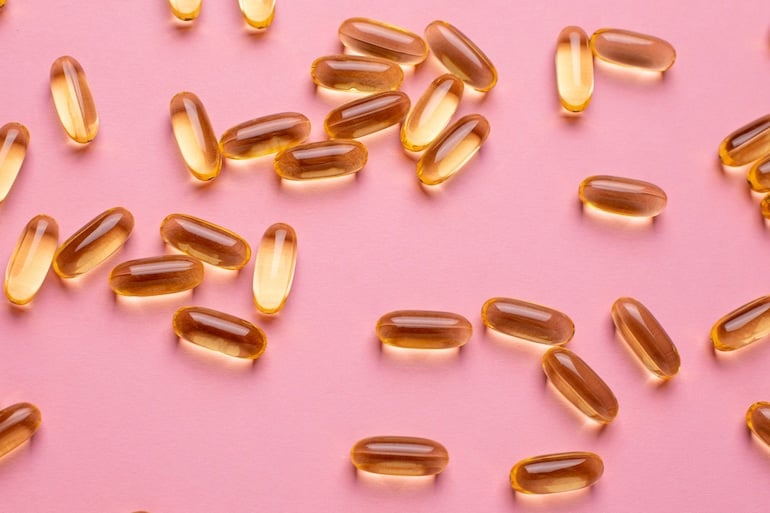
Are you a part of the 80-90 percent of Americans who don’t meet the recommended seafood intake of 8 ounces weekly? If so, you’re not alone. But if you’re not meeting these guidelines, you’re also probably not getting sufficient amounts of omega-3 fatty acids.
There are three types of omega-3 fatty acids (learn more about them here.) While most Americans consume enough ALA omega-3 fatty acids, they fall short when it comes to EPA and DHA. EPA and DHA are important to promote good skin health, brain health, heart health, and more.
Fish and shellfish are amongst the top sources of high-quality EPA and DHA you can consume from your diet. If you dislike fish, choose not to eat it, are allergic, or simply don’t have access to regularly consume fish, supplementing with omega-3s may be a good idea. Look for a high-quality fish oil supplement that specifically contains EPA and DHA omega-3 fatty acids.
OMG! Omega the Great is HUM’s ultra-pure omega-3 fish oil, with an ideal ratio of EPA and DHA, that improves skin redness, hydration, and tone. This ratio of EPA and DHA has been shown to balance cholesterol levels. If you’re nervous about a fishy aftertaste, rest assured this one has none.
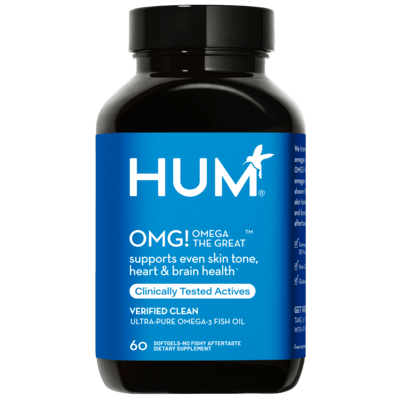
Calcium
In the U.S., studies show that 72 percent of calcium intake comes from dairy products, including milk, cheese, and yogurt. But with more people than ever are going dairy-free, you could be missing the mark on calcium intake.
Current guidelines suggest that women 18-50 years old and men 18-70 years of age require 1,000 milligrams (mg) of calcium daily. Teenagers and older individuals have even increased needs.
It’s possible to meet your daily calcium needs on a dairy-free diet, but you’ll need to be strategic. Calcium can be found in non-dairy foods and fortified foods, including fortified plant-based milk, fortified orange juice, tofu, canned salmon with the bones, canned sardines, and more.
If you’re unsure if you’re meeting your calcium needs, check with your doctor if you need a supplement. HUM’s Got Calcium may be able to fill in the blanks from your diet.
Vitamin B12
If you are a strict vegetarian or vegan, being aware of your vitamin B12 intake is crucial for your overall health. Vitamin B12 is largely limited to animal-based foods. Inadequate intake is associated with major health concerns, such as fatigue, numbness, poor memory, and more. This is because vitamin B12 has widespread effects in your body, including red blood cell formation, energy production, and nervous system support.
If your diet restricts animal-based foods, a vitamin B12 supplement is essential. HUM’s B12 Turbo is a vegan B12 supplement to help fill in the gaps missing from your diet.
How to find out your exact nutrient needs

Nutrition is highly personalized because everyone has different nutrient needs based on their diet, lifestyle, age, sex, and more. If you’re still unsure about the best vitamins to take daily, we made it simple.
The HUM Quiz is a free 3-minute quiz with questions about your diet and lifestyle. You’ll receive a personalized report from one of HUM’s registered dietitians with supplement recommendations personalized for you.
Even more, you can interact with your personal dietitian to ask questions, receive support, and get feedback to ensure your nutrition and supplement routine are exactly what you need.
You can ask your HUM dietitian anything to help meet your nutrition goals. For instance, maybe you’re concerned about dry winter skin, stress, feeling bloated after eating, aging skin, bowel regularity, or PMS symptoms. (These are some of our recommended questions to ask a dietitian.) No matter your beauty and wellness concerns, we’re happy to provide nutrition and supplement recommendations to help.
Once your basic nutrient needs are met through good nutrition and a basic supplement routine, you’ll be on your way to feeling your best. Remember that you can always tweak your routine along the way to meet your specific goals, as they change over time.
